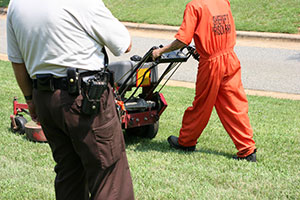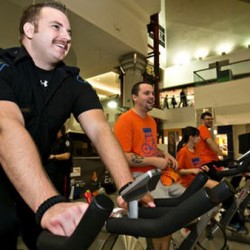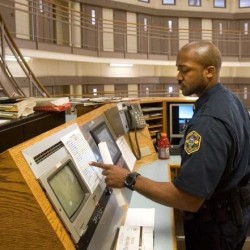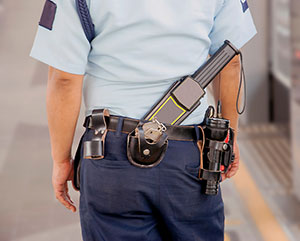
In and of itself, the general population of any prison setting presents challenges. Those same challenges imply room for change and growth. Like peace officers working the streets, the concept of prison officials engaging individuals with autism has its own brand of procedural issues. The dynamics of autism--and those disorders falling within this spectrum--presents circumstances that challenge law enforcement principles, and hinders access to advocacy and treatment and for inmates.
Oxford Dictionaries defines autism as "a mental condition, present from early childhood, characterized by difficulty in communicating and forming relationships with other people and in using language and abstract concepts."
In the criminal justice profession, compliance and control factors are largely responded to in the manner in which we are trained. However, inmates with autism may fly-against-the-grain in this regard. Therefore, a conundrum exists. So, as peace officers, what do we do? Are we adequately trained for these interactions?
Increasingly, media outlets are reporting instances whereby police officers are confronting subjects on the streets and encountering behaviors of some as "resisting verbal commands" and "obstructing justice," among others. Eventually, the presence of autism is discovered after these police/civilian engagements. To understand autism is to realize why this may be a typical outcome. Whereas, it is easy to understand why peace officers arrive at such "non-compliance" conclusions, resulting in arrest, an understanding of the nuances of autism (and perhaps other behavior-based disorders) can also abate potential standoffs. Are we there yet?
Case-in-point; a real-life encounter occurred in Virginia in 2010. Reginald “Neli” Latson, an autistic man, got into trouble with the law. Latson struck a law enforcement officer who tried to arrest him pursuant to a "suspicious activity" investigation. Reported by ThinkProgress.org in January 2015, Latson is facing trial and, if convicted, a hefty prison sentence. ACLU lawyers contend that Latson's intellectual disability is the root cause of him hitting a law enforcement official. Further, the legal team defending Latson suggests that the entire criminal justice system –police officers, prosecutors, and jailers-- negated Latson's unique circumstances and, by doing so, failed to administer understanding and treatment while in custody. Reportedly, Latson was placed in solitary confinement, potentially exacerbating his condition and worsening the dilemma. (While awaiting court dates and due process, Latson "acted-out" and incurred additional charges).
While there are many complexities to autism-spectrum disorders we currently do not totally understand, we do know some basics. For example, when added to the training regimen, fundamental details about autism-spectrum disorders can help peace officers in such encounters. Essentially, an individual with autism is not necessarily lawlessly ignoring lawful order(s). The neural networking of people with autism is not the same as non-autistics; seeming disobedience is actually a lack of understanding and disdain for noise (clinical basis, as in overwhelm) and thus a shut-down is chosen. It becomes a stance (a posture, perhaps mistakenly perceived by LEOs) to stave off further overstimulation (noises, bright lights, ample movements, rapid activities).
An upheaval of anxiety evolves (a common trait in those with autism), the results of cause reactive behaviors misconstrued by many, including law enforcement officials. It is equivalent to a deaf individual not responding to your lawful commands merely because of their inability to hear, and not because they are intentionally ignoring you and hoping you simply go away. This example is real, may very well incur an impasse, and can jar the cage needlessly. This is where education will facilitate understanding, potentially abating catastrophe.
A symptom which further illustrates this dilemma is that many people with autism are non-verbal. Still others are both non-verbal and deaf. Thus, American Sign Language (ASL) may be an alternate means of communication. Can you see how, by virtue of these circumstances, getting-off-on-the-wrong-foot encounters may be imminent , yet avoidable? Or, why encouragement to dig deeper into this issue, so that your correctional officer oath is fulfilled is so vital? Logically, the immediate reaction from a law enforcement officer is one of, "They're resisting me!" In reality, it is two individuals --peace officer and subject with autism-- who are at polar ends of understanding each other. So, why not meet in the middle?
Training of law enforcement officials remains perpetual, as it should be. At the alarming rate societies are unfolding, it is foolhardy for justice professionals to continue with the status-quo. Much like cardiologists are constantly advancing in ways to sustain patients' lives with modernized medical devices (implants), why not avail the same forward-thinking response at penal institutions?
The following abstract statement prefaced the 2009-publication, "Autism in the criminal justice detention system: A review of the literature," commissioned via the U.S. National Institute of Health (NIH): "Little is known about the experience of people with autism in custody. A review of the literature that explored the relationship between autism and criminality and the criminal justice detention system was conducted. Literature suggests that people with autism are potentially overrepresented within the criminal justice system. There is little research that has examined the experiences of people with autism spectrum disorders in custody. There is very little to guide service design to develop autism support services for people in prison."
Under the U.S. Department of Justice, the Federal Bureau of Prisons amended and published (May 2014) its agenda to handle/treat mentally unstable inmates. The program, "Treatment and Care of Inmates with Mental Illness," proscribed advancements of how such inmates (patients) are treated while incarcerated. Labeled a "re-issuance" of former prison system protocols related to mental-disordered inmates, "intervention-based criteria" is included. Autism is not something one "catches" like a cold. With that said, each person diagnosed is not at-fault for such a neural disorder; a myriad of studies seek to solve that puzzle. We are not there yet. However, in a prison environment he/she may be made to pay for it. This is tantamount to a double-edged razor.
A particular focus on autism-afflicted inmates, classified by BOP under the umbrella category as "Intellectual Disabilities and Autism Spectrum Disorders" and "Major Neurocognitive Disorders," seeks to treat affected inmates with a multidisciplinary modality.
At the core of the aforementioned BOP agenda is to, "Hold rapport-building and mutual concern among members as a primary goal... towards ensuring optimal outcomes for inmates with autism and related disabilities.” From this suggestion (criteria point), rapport is an operative word to achieving "positive staff relationships." However important rapport-building may be, it is secondary to the duality of alerting COs of inmates affected with autism, as much as it is to comprehensively train prison officers to properly handle any dilemmas imposed by/upon those with autism.
Synonymously, the BOJ publication underscored that "during rounds, all staff will make themselves available for brief conversations [with inmates] that demonstrate concern and their availability to provide assistance." Besides common sense applications, the BOJ mandates that "mental health training for all staff is included in Introduction to Correctional Techniques I and II and Annual Training. Mental health training is also provided on a quarterly basis to SHU (Special Housing Unit) officers."
The Center for Autism and Related Disabilities (CARD) studies all aspects of autism. CARD, with locations across the US, produces and distributes pamphlets specifically addressing interactions between the law enforcement community and those with autism. The goal of CARD materials is to educate officers to defray potentially adverse encounters, by instilling a mutual understanding of the dynamics of autism as well as the principles practiced by peace officers.
Akin to CARD, Autism Speaks and other organizations representing the autism community have also generated literature and resource materials specifically intended for the law enforcement community. It behooves all involved to become familiar with the dynamics of autism, especially when custodial aspects may arise.
Does your correctional facility --whether on a state, county, or municipal level-- provide mental health training to COs to recognize and appropriately deal with those inmates on the autism spectrum? If so, is there a continuum of training to keep abreast of the evolution of autism and inmates? Are you at least taking the initiative, gleaning all you can on the topic of autism? Applying what you learned while you are on-duty? Or, are you left to your own devices?
During a retreat to learn Buddhist principles and philosophies, Police Officer, Cheri Maples had the following to say of her experience, under the guidance of world-renowned Thich Nhat "Thay" Hanh: "Thay convinced me that part of the skillset of a police officer was the ability to employ both the gentle compassion of understanding and the fierce compassion of setting boundaries to protect others, including using force to intervene if people were physically harming one another. For a police officer, wisdom is being able to discern when gentle compassion is called for and when fierce compassion is called for."
In conclusion, although the law enforcement profession has stringent rigors, rules, regulations, policies, and pitfalls, there is always room for self-improvement, both departmentally and personally. Don't allow yourself to fall into the pit of professional decay! Delve into new things, whether you think you need it on the job or not. If nothing else, you will become a more well-rounded person, for all the right reasons.
As I conducted research for this article, the need to gather statistical data pertaining to inmates with autism is cited. However, no concrete data exists, yet. Globally, other nations cite the same need to aggregate statistics regarding inmates with autism. This emphasizes why a cursory study by COs is essential. My advice? Read, read, read. You can be a pioneer, bringing this dilemma to full attention and actionable resolve. Do not discount your potential.
As a dad of an intensely autistic daughter (15) being rehabilitated at a residential/clinical setting, I can wholeheartedly comprehend the dynamics, and I can also relate to the inter-relations between my child and the professional staff who administer her care. Perhaps the best way to place this article into definitive context is to ask the question: How would you prefer your loved one to be treated if they were incarcerated, diagnosed mentally unstable (autistic or otherwise), and frightened by the venue which is premised on rules, regulations and absolute order? Can you see how counterintuitive this model can be for someone lacking in social skills and/or cognitive abilities?
My child yanks at and starts to pull down her pants (indicating her need to use the restroom). If done in public (or in a penal setting), this may be construed as one or more violations of law (or an affront to institutional policy). Again, the malicious intent is non-existent, as is the comprehension of society's rules. Can you see how this may be misinterpreted by law enforcement professionals? A proverbial Catch-22 prevails.
Can you also see how some individuals serving time, who are also burdened with mental disorders, may need an understanding from prison officials to defray the enormity of their emotional boulders? Not to excuse "bad behavior" but, with more knowledge and an understanding of the dynamics regarding autism, it may be possible to discern the difference between criminal intent and seemingly lawless behavior stemming from intellectual deficiency. There is little doubt that the conscious effort to commit a crime versus an individual exhibiting inability to comprehend his/her actions can make a difference in encounters with peace officers.
This is not to suggest excusing bad behavior, only to understand why.
Co-founders of Autism Speaks wrote a letter to Virginia Governor Terry McAuliffe, appealing for proper treatment of inmate Latson (mentioned above): "Neli Latson, however, has a longstanding autism diagnosis and his inappropriate reactive behaviors are manifestations of that diagnosis." (Bolded by the author of this article, for contextual emphasis.)
While nearing final edit of this article, I happened to see a newsfeed piece announcing A&E's new series Behind Bars: Rookie Year. I read some of the commentary on the show's Facebook page, and the following stood out: "You have a good heart and work ethics - you give respect to those incarcerated and I believe some of them respect you for that and know that you care!"
One of the show's favorite correctional officers, Keith Pallesen, authentically declared: "My motto at work is: I'm human, you're human, you bleed, I bleed."
As a correctional officer, whether on A&E or physically reporting for duty at your prison facility, can you see yourself reaching a little bit further...so that an inmate afflicted with autism or any other mental disorder can feel the impacts of a caring gatekeeper?
Obtain free copies of the Autism Safety Project literature offered by Autism Speaks. This material is specifically designed for law enforcement professionals. Distribute the pamphlets among your peers. Be on the same page. Set the tone. It can only help in regards to working in a properly functioning prison facility.
By all accounts --globally and here in the United States-- there is much work to be done. Each one of our fine corrections officers can play a vital role in this undertaking. Lives depend on it.
As Police Officer, Cheri Maples, stated earlier, "...wisdom is being able to discern when gentle compassion is called for and when fierce compassion is called for." That, my friends, rather sums it up.
You can make a difference!








